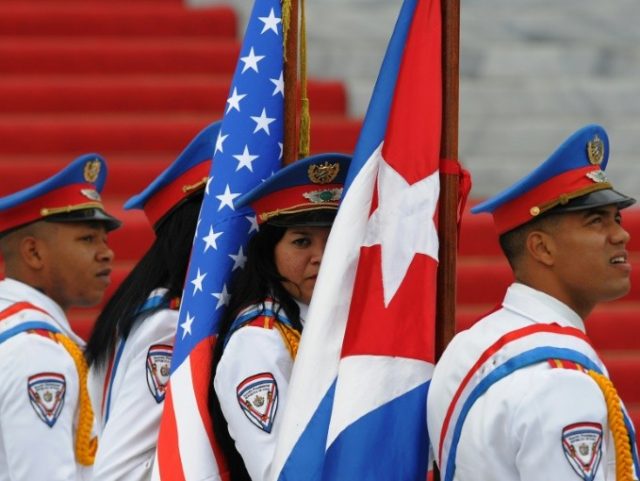The communist government of Cuba announced Wednesday that it would begin “five days of nationwide military exercises” to “materialize the doctrine of All People’s War,” according to the state propaganda arm.
The announcement follows the election of Republican Donald Trump as U.S. president, who made opposition to the human rights violations of the communist regime the cornerstone of his outreach to the American Latino community.
The Cuban propaganda outlet Granma announced the military exercises as “part of the nation’s defense preparation.” The announcement leaves deliberately vague what sort of exercises will go on, describing them only as “maneuvers and tactical exercises of different kinds,” and describes them as occurring “nationwide” without specifying any locations in particular. It also does not provide any reason for the immediate need for such an exercise.
“The Bastion Strategic Exercises” – as the Castro regime is referring to the exercises – “constitute an essential element in the materialization of the doctrine of the All People’s War,” the communist publication concludes.
The Associated Press notes that, while the government has not given a reason for the sudden announcement of military exercises, they appear to be linked to the election of Donald Trump. “It is the seventh time Cuba has held what it calls the Bastion Strategic Exercise, often in response to points of high tension with the United States,” the AP recalls. “The first exercise was launched in 1980 after the election of Ronald Reagan as U.S. president.”
The Granma certainly made clear in its coverage of the 2016 presidential election that it did not prefer Trump to Clinton as a strategic partner, smearing Trump with the claim that his campaign employed “strong rhetoric against immigrants and women.” The Cuban government has reason for concern that its previously cushy relationship with the Obama administration will cease to exist under a President Trump.
“All of the concessions that Barack Obama has granted the Castro Regime were done through executive order, which means the next President can reverse them, and that is what I will do,” Trump said in a speech in September, promising his Cuban-American voters. Trump’s campaign actively engaged the Cuban refugee population of South Florida – as well as the more recent arrivals from Cuban puppet state Venezuela – gaining an historic endorsement from the Brigada 2506: the freedom fighters to executed the military siege of Bay of Pigs.
Speaking to the group at Miami’s Bay of Pigs museum, Trump made the Ladies in White – a peaceful anti-communist dissident group of women that routinely suffers beatings, torture, and arbitrary arrest under the Castro regime – an issue in a U.S. campaign otherwise focused on domestic issues like trade.
Trump’s approach to the Cuban regime stands in stark contrast to the moves President Barack Obama made in office to embolden the Castros. Following his 2014 announcement that Washington would seek “normalization” with the Castros, the President made a personal visit to Havana, where he did “the wave” with Raúl Castro and posed for photos in front of the likeness of mass murderer Ernesto “Che” Guevara.
For his trouble, the Cuban press referred to President Obama as a “negro… inciting rebellion and disorder” and Cuban officials referred to his visit as an “attack.”
Democratic nominee Hillary Clinton supported President Obama’s engagement of the Castro regime, and served as First Lady during a presidency especially marred by Cuban human rights violations and egregious government acts against Cuban refugees. Under President Bill Clinton, the Cuban government killed four humanitarian workers belonging to the Brothers to the Rescue group, including U.S. citizens. Clinton asserted he was “concerned” but did nothing to ensure Cuba did not lash out again.
The United States also did nothing to condemn the Clinton-era massacre of 37 Cuban refugees, including women and children, the Cuban government drowned on the March 13 tugboat.
In 2000, the Clinton administration stormed the home of Cuban refugees, abducting six-year-old Elián González at gunpoint and returning him to a nation his mother died trying to get him out of.

COMMENTS
Please let us know if you're having issues with commenting.